- Home
- L. Ron Hubbard
Writers of the Future Volume 31
Writers of the Future Volume 31 Read online
Thirteen Award-Winning Stories take you to places you’ve never been before
You are invited …
To a future where a cop’s performance depends upon the quality of his illegal brain-enhancing drugs.
To the home of Jack, who is troubled by a misbehaving pet Death God name Zu’ar.
To the planet Hesperidee, where one girl is on the brink of becoming something other than human.
To hop between doomed planets … and celebrate each one’s apocalypse.
There is a world where …
Mankind’s sins must be forgiven, lest it be doomed.
The spirit in Abe’s magical book makes big promises, but will only deliver at a tremendous cost.
The mobsters in Vinh Quang hope to purchase freedom for entire families—if they can just avoid the cops.
One young man’s hallucination might be a ghost—or the key to survival.
Meet the neighbors …
A girl named Elizabeth is haunted by ghostly echoes from her past.
A person whose genetic upgrades let him speak only in five-word sentences.
The kids at Kessington House—a dorm for the psychomorphically unstable.
A writer gets to see what he could have created, if he’d only found the courage.
You think you have problems?
In the seaside resort of Summerland, a young artist struggles to complete a mural, and mend broken spirits.
Daniel’s neighbors want your life—but only because they need it to get your soul.
Sam is trapped on a refinery in space and his fusion reactor is about to blow—and that’s just the first of his problems.
It seems that our sun has just exploded.
What has been said about the
L. Ron Hubbard PRESENTS
Writers of the Future
Anthologies
“Always a glimpse of tomorrow’s stars …”
— Publishers Weekly starred review
“Not only is the writing excellent … it is also extremely varied. There’s a lot of hot new talent in it.”
— Locus magazine
“A first-rate collection of stories and illustrations.”
— Booklist magazine
“I really can’t say enough good things about Writers of the Future.… It’s fair to say that without Writers of the Future, I wouldn’t be where I am today.…”
— Patrick Rothfuss
Writers of the Future Contest winner 2002
“The book you are holding in your hands is our first sight of the next generation of science fiction and fantasy writers.”
— Orson Scott Card
Writers of the Future Contest judge
“If you want a glimpse of the future—the future of science fiction—look at these first publications of tomorrow’s masters.”
— Kevin J. Anderson
Writers of the Future Contest judge
“Where can an aspiring sci-fi artist go to get discovered?… Fortunately, there’s one opportunity—the Illustrators of the Future Contest—that offers up-and-coming artists an honest-to-goodness shot at science fiction stardom.”
— Sci Fi magazine
“The Illustrators of the Future Contest is one of the best opportunities a young artist will ever get. You have nothing to lose and a lot to win.”
— Frank Frazetta
Illustrators of the Future Contest judge
“The Illustrators of the Future competition has been at the forefront for many years, to support new and enthusiastic artists pursuing their dreams, and see them fulfilled.”
— Stephen Youll
Illustrators of the Future Contest judge
“The Writers of the Future Contest played a critical role in the early stages of my career as a writer.”
— Eric Flint
Writers of the Future Contest winner 1993 and Contest judge
“The Writers of the Future Contest was definitely an accelerator to my writing development. I learned so much, and it came at just the right moment for me.”
— Jo Beverley
Writers of the Future Contest winner 1988
“The Contests are amazing competitions because really, you’ve nothing to lose and they provide good positive encouragement to anyone who wins. Judging the entries is always a lot of fun and inspiring. I wish I had something like this when I was getting started—very positive and cool.”
— Bob Eggleton
Illustrators of the Future Contest judge
L. Ron Hubbard PRESENTS
Writers of the Future
VOLUME 31
L. Ron Hubbard PRESENTS
Writers of the Future
VOLUME 31
The year’s thirteen best tales from the Writers of the Future international writers’ program
Illustrated by winners in the Illustrators of the Future international illustrators’ program
Three short stories from authors L. Ron Hubbard / Kevin J. Anderson & Rebecca Moesta / Larry Niven
With essays on writing and illustration by L. Ron Hubbard / Orson Scott Card / Bob Eggleton
Edited by David Farland
Illustrations Art Directed by Bob Eggleton
GALAXY PRESS, INC
© 2015 Galaxy Press, Inc. All Rights Reserved.
Any unauthorized copying, translation, duplication, importation or distribution, in whole or in part, by any means, including electronic copying, storage or transmission, is a violation of applicable laws.
No part of this book may be used or reproduced in any manner whatsoever without written permission except in the case of brief quotations embodied in critical articles or reviews. For information, contact Galaxy Press, Inc. at 7051 Hollywood Blvd., Suite 200, Hollywood, California, 90028.
“Switch”: © 2015 Steve Pantazis
“The God Whisperer”: © 2015 Daniel J. Davis
“Stars That Make Dark Heaven Light”: © 2015 Sharon Roest
“Art”: © 1965 L. Ron Hubbard Library
“When Shadows Fall”: © 2008 L. Ron Hubbard Library
“A Revolutionary’s Guide to Practical Conjuration”: © 2015 Auston Habershaw
“Twelve Minutes to Vinh Quang”: © 2015 Tim Napper
“Planar Ghosts”: © 2015 Krystal Grell
“Rough Draft”: © 2005 WordFire, Inc. Originally published in Analog magazine, Jan/Feb 2005
“Between Screens”: © 2015 Zach Chapman
“Unrefined”: © 2015 Martin L. Shoemaker
“Half Past”: © 2015 Samantha Murray
“Purposes Made for Alien Minds”: © 2015 Scott R. Parkin
“Inconstant Moon”: © 1971, 1999 Larry Niven.
“The Graver”: © 2015 Amy M. Hughes
“Wisteria Melancholy”: © 2015 Michael T. Banker
“Poseidon’s Eyes”: © 2015 Kary Wyman
Illustration on pages 23, 463, 233 and 462: © 2015 Daniel Tyka
Illustration on pages 55 and 449: © 2015 Alex Brock
Illustration on pages 65 and 464: © 2015 Choong Yoon
Illustration on pages 132 and 457: © 2015 Greg Opalinski
Illustration on pages 169 and 453: © 2015 Shuangjian Liu
Illustration on pages 175 and 459: © 2015 Quinlan Septer
Illustration on pages 192 and 450: © 2015 Amit Dutta
Illustration on pages 259 and 461: © 2015 Trevor Smith
Illustration on pages 272 and 452: © 2015 Tung Chi Lee
Illustration on pages 303 and 451: © 2
015 Megan Kelchner
Illustration on pages 317 and 460: © 2015 Emily Siu
Illustration on pages 355 and 455: © 2015 Bernardo Mota
Illustration on pages 388 and 458: © 2015 Taylor Payton
Illustration on pages 418 and 454: © 2015 Michelle Lockamy
Illustration on pages 439 and 456: © 2015 Megen Nelson
Cover Artwork: Queen of Angels © 1994 Bob Eggleton
Preface by Peter J. Wacks
Interior Design by Jerry Kelly
This anthology contains works of fiction. Names, characters, places and incidents are either the product of the authors’ imaginations or are used fictitiously. Any resemblance to actual events or locales or persons, living or dead, is entirely coincidental. Opinions expressed by nonfiction essayists are their own.
ISBN 978-1-61986-319-4 EPUB edition
ISBN 978-1-61986-320-0 Kindle edition
ISBN 978-1-61986-322-4 Trade paperback edition
Library of Congress Control Number: 2015903029
Printed in the United States of America
BATTLEFIELD EARTH is a registered trademark owned by Author Services, Inc., and is used with its permission. WRITERS OF THE FUTURE (word and medallion) and ILLUSTRATORS OF THE FUTURE and its logo are trademarks owned by the L. Ron Hubbard Library and are used with permission.
CONTENTS
Preface
Introduction
by David Farland
Switch
by Steve Pantazis
Illustrated by Daniel Tyka
The God Whisperer
by Daniel J. Davis
Illustrated by Alex Brock
Stars That Make Dark Heaven Light
by Sharon Joss
Illustrated by Choong Yoon
Art
by L. Ron Hubbard
When Shadows Fall
by L. Ron Hubbard
Illustrated by Greg Opalinski
A Revolutionary’s Guide to Practical Conjuration
by Auston Habershaw
Illustrated by Shuangjian Liu
Twelve Minutes to Vinh Quang
by Tim Napper
Illustrated by Quinlan Septer
Planar Ghosts
by Krystal Claxton
Illustrated by Amit Dutta
Fiction without Paper
by Orson Scott Card
Rough Draft
by Kevin J. Anderson & Rebecca Moesta
Illustrated by Daniel Tyka
Between Screens
by Zach Chapman
Illustrated by Trevor Smith
Unrefined
by Martin L. Shoemaker
Illustrated by Tung Chi Lee
Half Past
by Samantha Murray
Illustrated by Megan Kelchner
Purposes Made for Alien Minds
by Scott R. Parkin
Illustrated by Emily Siu
Inconstant Moon
by Larry Niven
Illustrated by Bernardo Mota
The Illustrators of the Future
by Bob Eggleton
The Graver
by Amy M. Hughes
Illustrated by Taylor Payton
Wisteria Melancholy
by Michael T. Banker
Illustrated by Michelle Lockamy
Poseidon’s Eyes
by Kary English
Illustrated by Megen Nelson
On the Direction of Art
by Bob Eggleton
List of Illustrations by Artist
The Year in the Contests
Preface
When Daedalus of Greek mythology first stretched his makeshift wings to soar toward the heavens, humanity was able to tell a story. It was a story of striving for something new, something greater than the fulfillment of a single life.
It was the story of reaching for the heavens, for what was above.
For thousands of years, the tradition of storytelling has breached the canopy of the sky on wings of imagination, despite the fear of repeating Icarus’ fiery crash.…
To tell a story is to embrace our spirit, our essence, our heart and our soul—it is to speak the language of dreams. For eons, that tradition went uninterrupted, spoken from generation to generation and painted on every possible surface. Then came canvas and the printed page, and with them, a new era of storytelling. The speed of our achievement began to match the pace of our dreams. The industrial revolution, which so shrank our world, also changed the nature of the stories we told. Daring adventurers stretched the limits of science and art, pursuing the dreams of the Creative, and humanity flew.
A single story could be shared with millions. Storytellers like Dickens, Verne, and Wells paved the way for Steinbeck, Mann, and Hubbard to lay a literary foundation for the Golden Age of Storytelling—a road map to the future. McCaffrey, Bradbury, Heinlein, Herbert, and a wave of far-seeing, almost prophetic, writers of the human condition created a new world for the modern novelist such as Kevin J. Anderson, Rebecca Moesta, Larry Niven, and Orson Scott Card to create in. In turn, these storytellers have found the bright torch of creation to be one that can be passed along to the next generation of great creators.
But a curious thing has happened … for a score of centuries, humanity strove to catch up to the impossible dream of Daedalus’ flight, and in the last eighty-five years, we caught up to the future told in the stories of those who wrote such far-fetched dreams. The current judges and winners of Writers of the Future live in a world where jet packs are real. Google is testing the self-driving car. Sony has created robots that look like humans.…
As the torch of imagination is shared with this newest group of Writers and Illustrators of the Future winners, we can only imagine what wonders they will discover as we come full circle into the New Golden Age.
Introduction
BY DAVID FARLAND
David Farland is a New York Times bestselling author with over fifty novel-length works to his credit.
As an author, David has won many awards for both his short stories and his novels. He won the grand prize in Writers of the Future Volume III for his story “On My Way to Paradise” in 1987, and quickly went on to begin publishing novels. He has since won numerous awards for his longer works, including the Philip K. Dick Memorial Special Award, the Whitney Award for Best Novel of the Year, the International Book Award for Best Young Adult Novel of the Year, and the Hollywood Book Festival Book of the Year Award — among many others.
Along the way, David has written a number of bestsellers, designed and scripted video games, such as the international bestseller StarCraft: Brood War, acted as a greenlighting analyst in Hollywood, and worked as a movie producer.
David has long been involved in helping to discover and train new writers, including a number who have gone on to become #1 international bestsellers — such as Brandon Mull (Fablehaven), Brandon Sanderson (The Way of Kings), James Dashner (The Maze Runner), Stephenie Meyer (Twilight), and many others.
David currently lives in Utah with his wife and children, where he is busily writing his next novel, teaching workshops and judging entries for L. Ron Hubbard Presents Writers of the Future, Volume 32.
Introduction
Each year I get to read thousands of stories for the L. Ron Hubbard Presents Writers of the Future Contest. It’s a bit like looking for perfect little diamonds among the tailings from a mine.
Sometimes, I’ll start reading a story and find just a gleam of talent. The story may show promise, but the author might need to do more work.
Other times, the gleam is strong and undeniable. I have a good story, but when I look at it from a certain angle, it seems to have a flaw or two.
Then there are those rare stories that are perfect gems—gleaming and fl
awless.
The stories that you’re about to read are some of those perfect gems. Once again we have winners from around the globe. What’s even cooler is, one of these writers will win the grand prize for the year. Which one? I don’t know. There are four first-place winners here, each so good that much will depend upon the tastes of our illustrious judges.
This year marks the 75th year since L. Ron Hubbard launched his first writing competition, “The Golden Pen,” on radio station KGBU while wintering in Ketchikan, Alaska. It was the genesis for the Writers of the Future, designed to create a level playing field for newcomers. “Anyone but professional writers may participate.” That was the rule.
The spirit of that competition flourishes today as we celebrate our 31st year of L. Ron Hubbard’s Writers of the Future Contest—making this one of the longest-running writing competitions in the world, and it is also one of the largest. For the Illustrators of the Future Contest, this ends the 26th year of our competition.
I vividly recall being a new writer poring through Volumes I and II of the anthology, trying to figure out what it would take to win. If you’re a writer, and you want to know what it takes, look at the stories here: I genuinely was delighted with every story in this anthology.
Each year, we see growth and changes in the Contest. The number of submissions continued to increase in the past year, and the Contest is taking on more and more of an international dimension.
When I read a story, I look for three things:
Is the concept fresh and original? By that I mean, is there something here that is unique?
Is the form of the story developed well? In other words, are the characters believable and interesting? Is their world well-realized? Does the character need to struggle repeatedly to deal with significant problems? Does the story touch upon themes that have broad implications for the rest of humanity?
Is the story told beautifully? Does the author write concisely, with power, and use the language well?
If the answer to those three rather broad categories of questions is yes, then I’ve got a story that is worthy of a prize. And in this anthology, we have thirteen worthy stories.

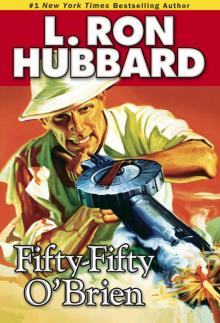 Fifty-Fifty O'Brien
Fifty-Fifty O'Brien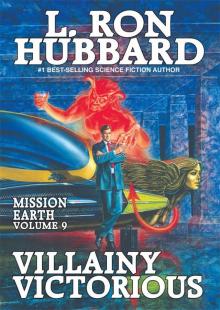 Villainy Victorious
Villainy Victorious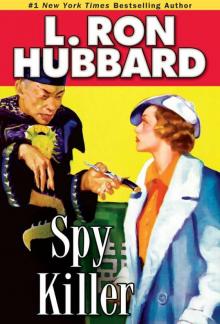 Spy Killer
Spy Killer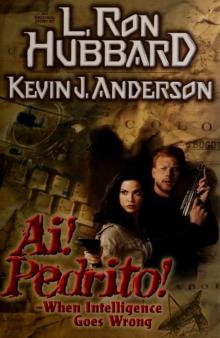 Ai! Pedrito!: When Intelligence Goes Wrong
Ai! Pedrito!: When Intelligence Goes Wrong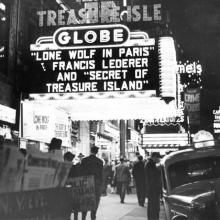 The Dangerous Dimension
The Dangerous Dimension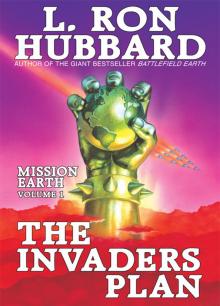 Mission Earth Volume 1: The Invaders Plan
Mission Earth Volume 1: The Invaders Plan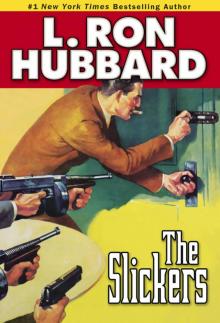 The Slickers
The Slickers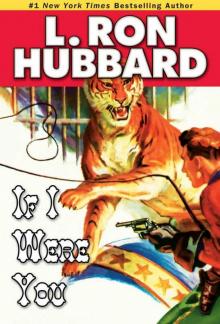 If I Were You
If I Were You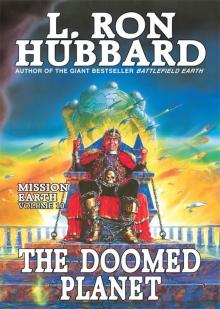 The Doomed Planet
The Doomed Planet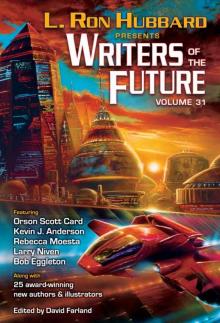 Writers of the Future Volume 31
Writers of the Future Volume 31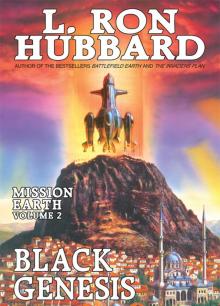 Mission Earth Volume 2: Black Genesis
Mission Earth Volume 2: Black Genesis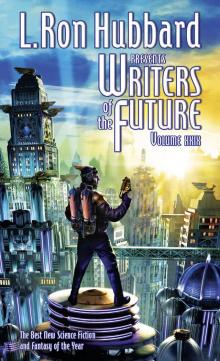 Writers of the Future: 29
Writers of the Future: 29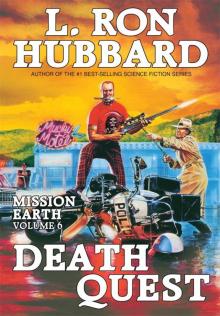 Death Quest
Death Quest The Enemy Within
The Enemy Within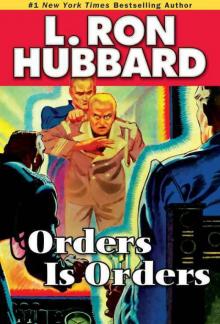 Orders Is Orders
Orders Is Orders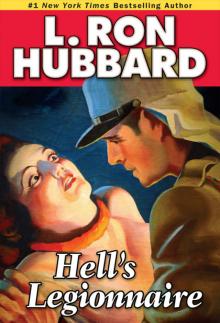 Hell's Legionnaire
Hell's Legionnaire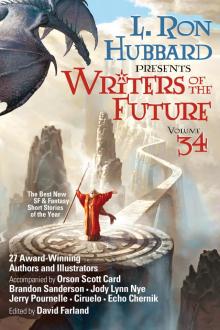 L. Ron Hubbard Presents Writers of the Future 34
L. Ron Hubbard Presents Writers of the Future 34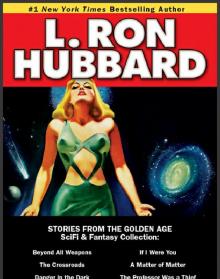 The Scifi & Fantasy Collection
The Scifi & Fantasy Collection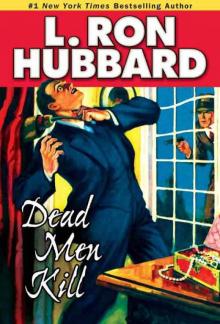 Dead Men Kill
Dead Men Kill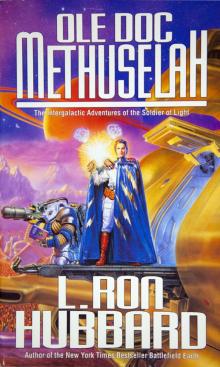 Ole Doc Methuselah: The Intergalactic Adventures of the Soldier of Light
Ole Doc Methuselah: The Intergalactic Adventures of the Soldier of Light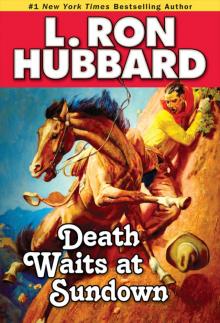 Shadows From Boot Hill
Shadows From Boot Hill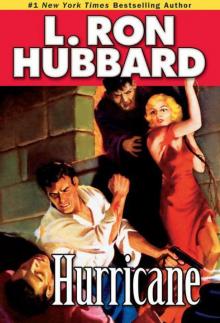 Hurricane
Hurricane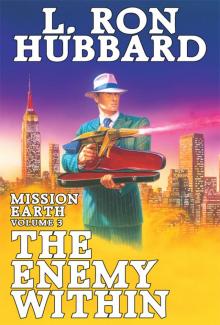 Mission Earth Volume 3: The Enemy Within
Mission Earth Volume 3: The Enemy Within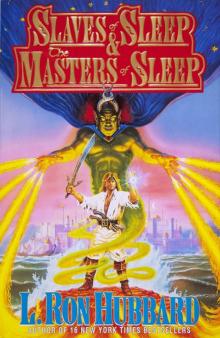 Slaves of Sleep & the Masters of Sleep
Slaves of Sleep & the Masters of Sleep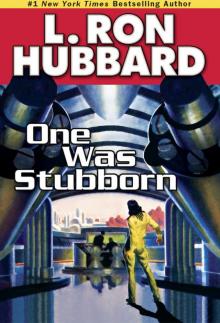 One Was Stubborn
One Was Stubborn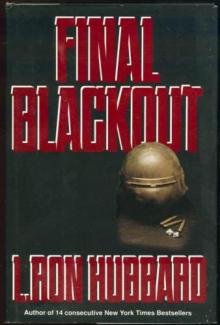 Final Blackout: A Futuristic War Novel
Final Blackout: A Futuristic War Novel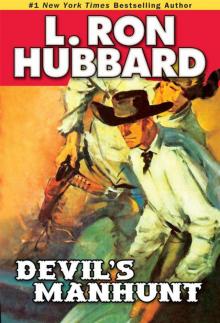 Devil's Manhunt
Devil's Manhunt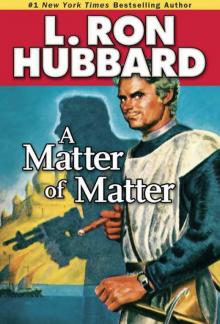 A Matter of Matter
A Matter of Matter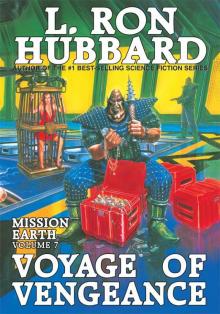 Voyage of Vengeance
Voyage of Vengeance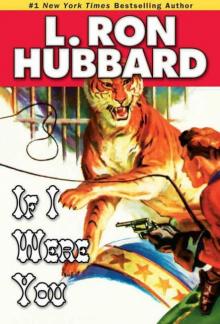 If I Were You (Science Fiction & Fantasy Short Stories Collection)
If I Were You (Science Fiction & Fantasy Short Stories Collection)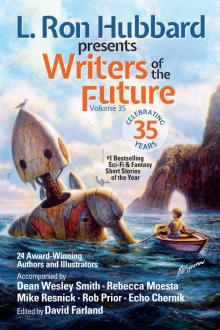 L. Ron Hubbard Presents Writers of the Future Volume 35
L. Ron Hubbard Presents Writers of the Future Volume 35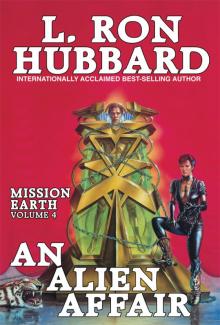 Mission Earth Volume 4: An Alien Affair
Mission Earth Volume 4: An Alien Affair Black Genesis
Black Genesis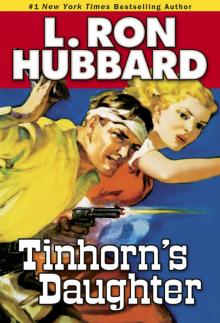 Tinhorn's Daughter
Tinhorn's Daughter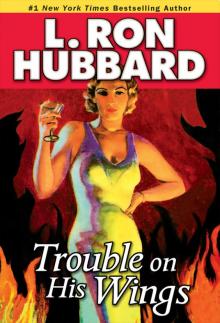 Trouble on His Wings
Trouble on His Wings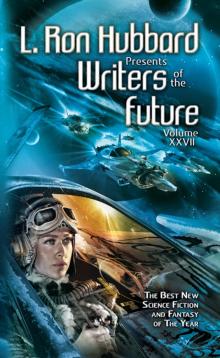 Writers of the Future Volume 27: The Best New Science Fiction and Fantasy of the Year
Writers of the Future Volume 27: The Best New Science Fiction and Fantasy of the Year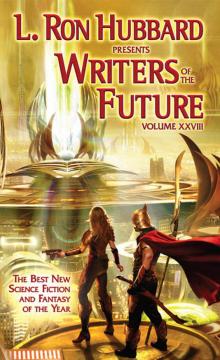 Writers of the Future Volume 28: The Best New Science Fiction and Fantasy of the Year
Writers of the Future Volume 28: The Best New Science Fiction and Fantasy of the Year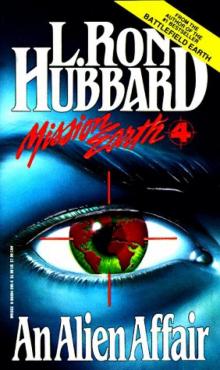 An Alien Affair
An Alien Affair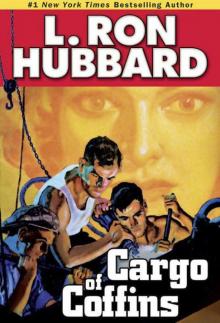 Cargo of Coffins
Cargo of Coffins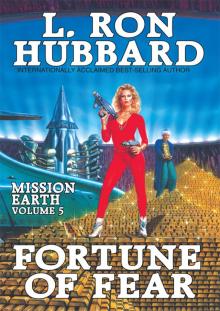 Mission Earth Volume 5: Fortune of Fear
Mission Earth Volume 5: Fortune of Fear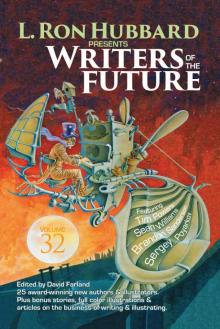 Writers of the Future 32 Science Fiction & Fantasy Anthology
Writers of the Future 32 Science Fiction & Fantasy Anthology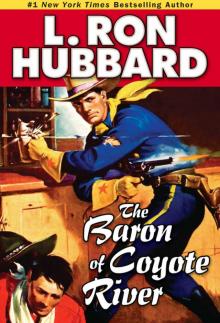 The Baron of Coyote River
The Baron of Coyote River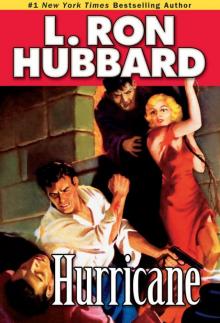 Hurricane (Stories From the Golden Age)
Hurricane (Stories From the Golden Age)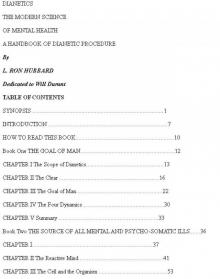 Dianetics: The Modern Science of Mental Health
Dianetics: The Modern Science of Mental Health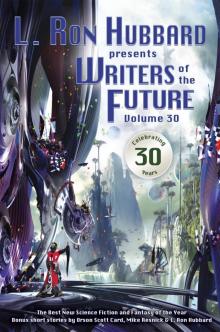 Writers of the Future, Volume 30
Writers of the Future, Volume 30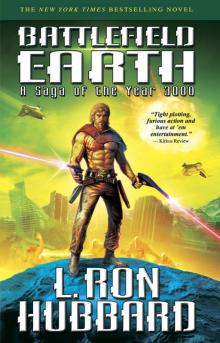 Battlefield Earth: A Saga of the Year 3000
Battlefield Earth: A Saga of the Year 3000 Fear
Fear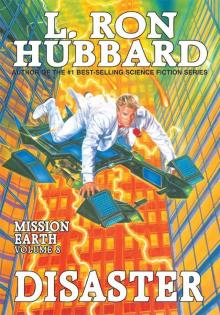 Disaster
Disaster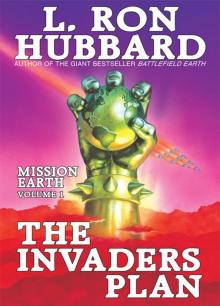 Invaders Plan, The: Mission Earth Volume 1
Invaders Plan, The: Mission Earth Volume 1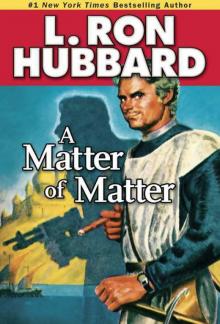 A Matter of Matter (Stories from the Golden Age)
A Matter of Matter (Stories from the Golden Age)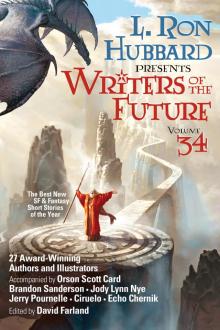 Writers of the Future Volume 34
Writers of the Future Volume 34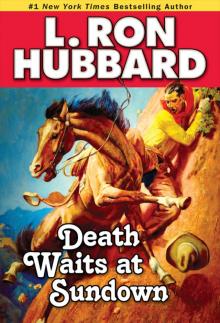 Death Waits at Sundown
Death Waits at Sundown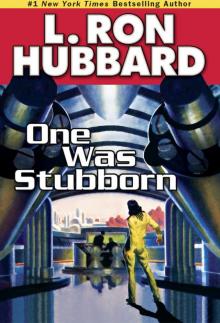 One Was Stubbron
One Was Stubbron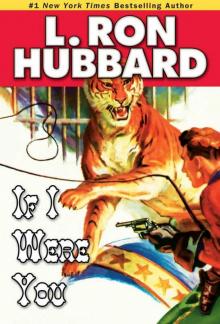 If I Were You (Stories from the Golden Age)
If I Were You (Stories from the Golden Age)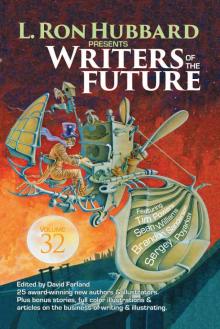 Writers of the Future 32 Science Fiction & Fantasy Anthology (L. Ron Hubbard Presents Writers of the Future)
Writers of the Future 32 Science Fiction & Fantasy Anthology (L. Ron Hubbard Presents Writers of the Future)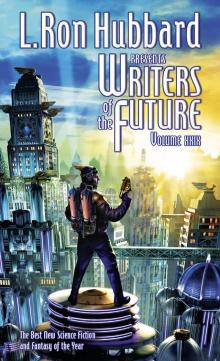 Writers of the Future, Volume 29
Writers of the Future, Volume 29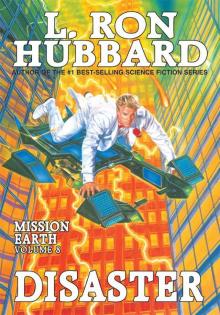 Mission Earth Volume 8: Disaster
Mission Earth Volume 8: Disaster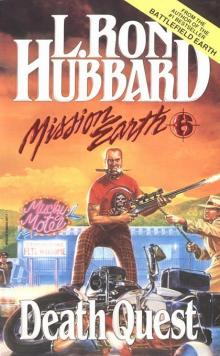 Mission Earth 6: Death Quest
Mission Earth 6: Death Quest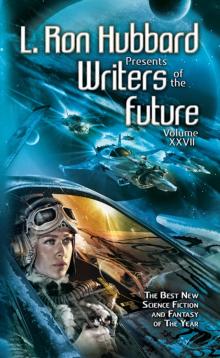 Writers of the Future, Volume 27
Writers of the Future, Volume 27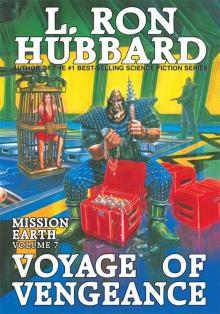 Mission Earth Volume 7: Voyage of Vengeance
Mission Earth Volume 7: Voyage of Vengeance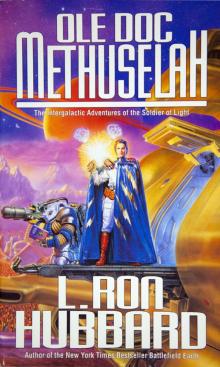 Ole Doc Methuselah
Ole Doc Methuselah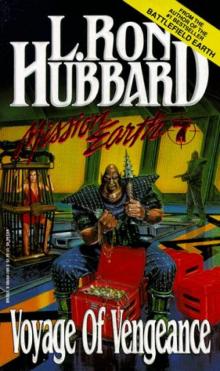 Mission Earth 07: Voyage of Vengeance
Mission Earth 07: Voyage of Vengeance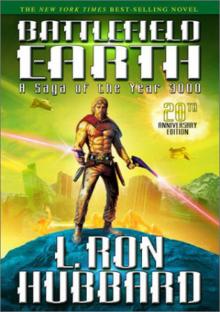 Battlefield Earth
Battlefield Earth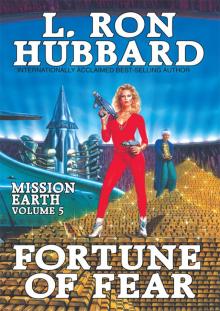 Fortune of Fear
Fortune of Fear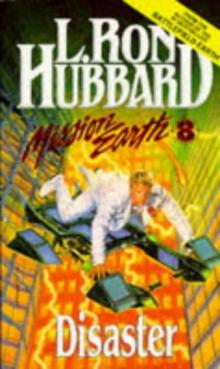 Mission Earth 8: Disaster
Mission Earth 8: Disaster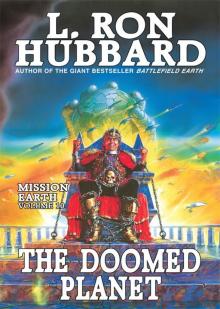 Mission Earth Volume 10: The Doomed Planet
Mission Earth Volume 10: The Doomed Planet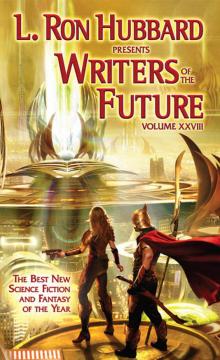 Writers of the Future, Volume 28
Writers of the Future, Volume 28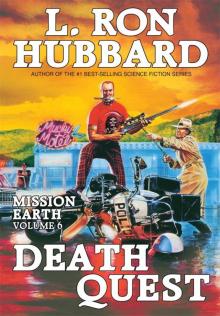 Mission Earth Volume 6: Death Quest
Mission Earth Volume 6: Death Quest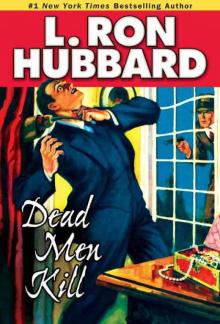 Dead Men Kill (Stories from the Golden Age)
Dead Men Kill (Stories from the Golden Age)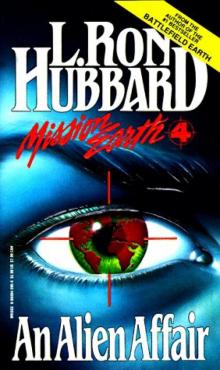 Mission Earth 4: An Alien Affair
Mission Earth 4: An Alien Affair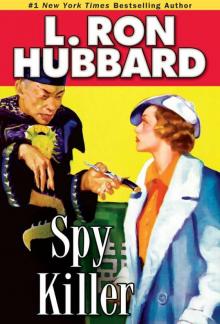 Spy Killer (Stories from the Golden Age)
Spy Killer (Stories from the Golden Age)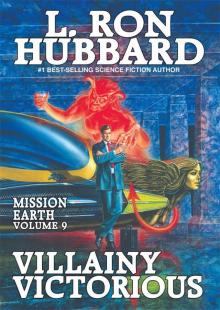 Mission Earth Volume 9: Villainy Victorious
Mission Earth Volume 9: Villainy Victorious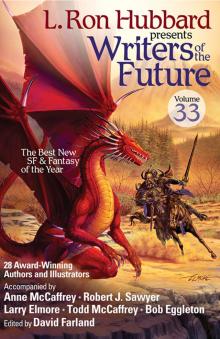 L. Ron Hubbard Presents Writers of the Future, Volume 33
L. Ron Hubbard Presents Writers of the Future, Volume 33